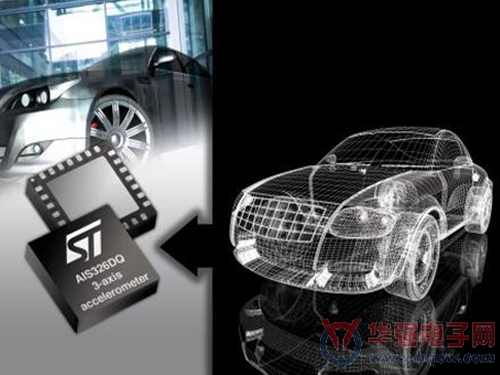
MEMS (Micro Electro Mechanical Systems) sensors are popular in the motion, acceleration, tilt and vibration measurement markets. MEMS sensors are system-level packaging solutions with many advantages such as high resolution, low power consumption, and compact size.
MEMS is completely different from a semiconductor chip that mainly utilizes the electrical properties of silicon. The core of the MEMS does not have a gate-drain-source triode, but a micromechanical structure made entirely of silicon. A typical MEMS structure includes a mass moment slider, a spring, and a damper. The working principle is basically the same as the mass spring model.
MEMS sensors can add an intuitive human-machine interface to mobile phones, MP3/MP4 players, PDAs, or game console controllers, enabling human interaction to interact with devices equipped with MEMS sensors.
In household appliances such as washing machines or clothes dryers, MEMS accelerometers can also act as vibration detectors. When the load on the machine is out of balance, the washing machine alarms the user to inform them of premature wear before the machine malfunctions.
Single-axis and dual-axis accelerometers are widely used in automotive passive safety systems such as frontal airbags and side airbags. Accelerometers and gyroscopes are also used in navigation systems and active safety systems such as ABS braking systems and wheel dynamic stability control systems.
A few years ago, MEMS sensors showed a trend of "consumer electronics." MEMS sensors have begun to penetrate the consumer electronics market to solve various application problems.
Consumer electronics manufacturers are looking for miniature, low-cost, low-power, low-power MEMS sensors. Slim design is a trend in battery-powered products such as mobile phones, MP3 and MP4 players, and portable PCs. Moreover, multi-axis sensors have become an essential configuration for consumer electronics devices, allowing consumers to activate any function from any physical location. In portable products, there is no fixed MEMS sensor application reference frame.
In addition, the life cycle of consumer electronics is getting shorter and shorter, so product designers demand that MEMS be integrated into final applications quickly and seamlessly.
At the cutting edge of MEMS technology, STMicroelectronics began integrating multiple sensors in a single package: accelerometers, gyroscopes, and geomagnetism. This solution can improve the functionality and performance of various applications, including motion monitoring. Integrated sensors can implement autonomous systems and automated systems, monitor specific conditions and convert them into operations without or with minimal user involvement.
In portable mobile devices such as mobile phones, game consoles, and personal navigation systems, a sensor capable of accurately measuring angular rates of three orthogonal axes can achieve 360° angular velocity detection and recognize 3D gestures and motions with high accuracy. In addition, a 3-axis accelerometer coupled with a gyroscope allows designers to develop inertial measurement units to track the type, speed, and direction of motion of humans, cars, and other objects and provide relevant, complete information.
STMicroelectronics' accelerometer contains many built-in enhancements, including single-click and double-click recognition, motion detection/awake, and 4D/6D direction detection. Other important features include a programmable FIFO (first-in-first-out) cache and two programmable interrupt signal output pins to immediately notify the host processor of conditions such as motion detection, click/double-click events, and more.
The integration of compass modules in mobile phones to provide advanced location-related services has triggered an application revolution in the mobile phone market. With compass and GPS capabilities, consumers can identify and search for information about related targets by simply pointing their phones to nearby facilities such as hotels or shopping malls.
The combination of motion detection and magnetic sensing can increase the experience of mobile users in many ways. Application developers can well solve the problem of viewing maps on mobile phones or PDAs with limited display sizes. They place the user's current location on the bottom of the map, and the rest of the display shows the direction of advancement (directly above). Get accurate advance information. When there is no GPS signal, one can indicate the direction in which a person or car is traveling. The solution also supports dead reckoning applications, including walking navigation in areas where GPS signals are not or very weak, such as when walking in high-rise buildings or in dense forested mountainous environments.
STMicroelectronics incorporated a 3-axis digital accelerometer and a 3-axis digital geomagnetometer in the LSM303DLH module. This digital compass has many advantages such as high precision, small size and low power consumption, which can meet the growing demand of the market for advanced navigation functions and emerging smart positioning services. ST’s high-performance system-in-package digital compass incorporates Honeywell’s magnetoresistive technology to facilitate the application of enhanced electronic compass capabilities in portable consumer electronics devices. The compass features include position finding, map/display orientation, Positioning service and walking direction estimation. The product's linear acceleration measurement range is ±2/±4/±8g, and the magnetic field strength measurement range is from ±1.3 to ±8 gauss. These two ranges can be arbitrarily selected by the user.
Many technologists and business experts believe that wireless sensor networks, home robots, smart tablets, and on-chip labs are the next commercial opportunities for MEMS sensors. For example, a tire pressure monitoring system consisting of a lab-on-a-chip and 5-node wireless pressure sensor network for personalized drug development purposes.
STMicroelectronics' MEMS experts are currently working hard to develop smart sensors. The 'smart sensor' integrates MEMS devices and processors in a single package, allowing the sensor algorithms to run independently without the intervention of the main processor, thereby reducing power consumption at the system level, which is of great significance for handheld devices that consume large amounts of power.

 MEMS (Micro Electro Mechanical Systems) sensors are popular in the motion, acceleration, tilt and vibration measurement markets. MEMS sensors are system-level packaging solutions with many advantages such as high resolution, low power consumption, and compact size.
MEMS (Micro Electro Mechanical Systems) sensors are popular in the motion, acceleration, tilt and vibration measurement markets. MEMS sensors are system-level packaging solutions with many advantages such as high resolution, low power consumption, and compact size. 
